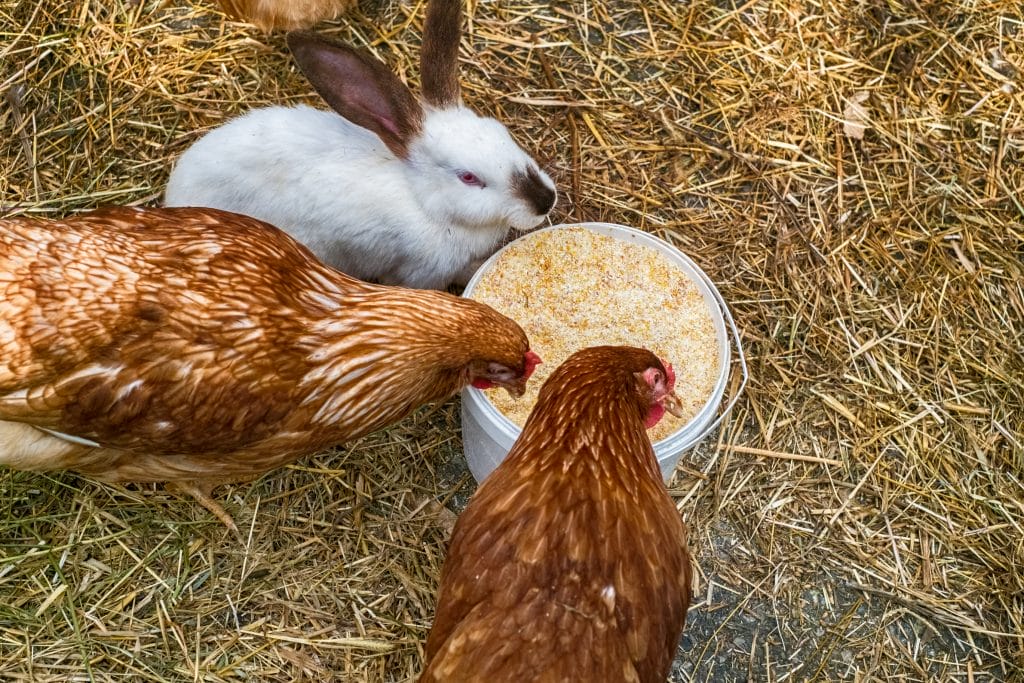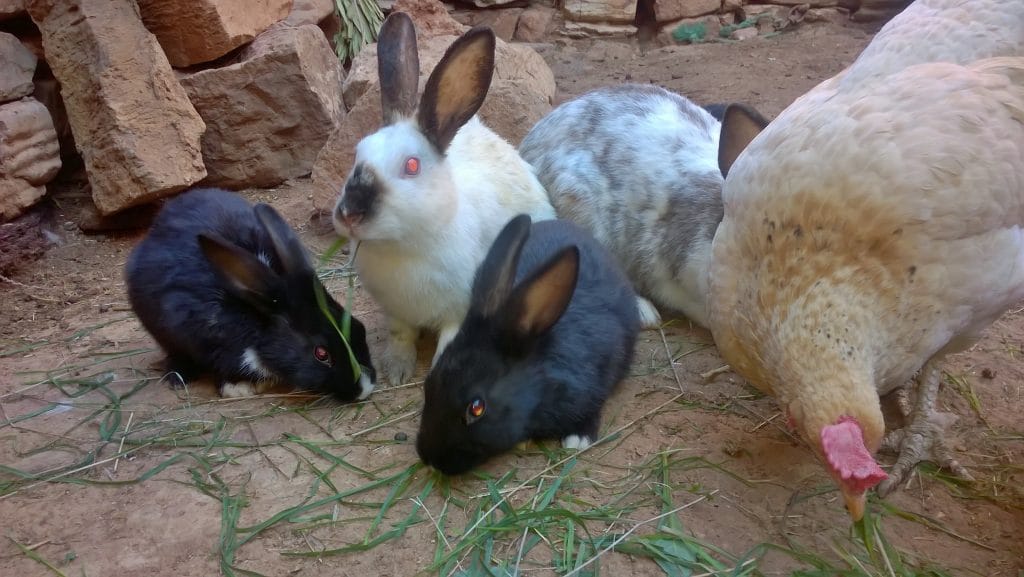Is Keeping Chicken & Rabbits Together A Good Idea?
Despite their differences, chickens and rabbits share many similar needs in order for them to live comfortably. This has led to many owners opting for a shared house or run to help save space and costs. However, the mixing of rabbits and chickens isn’t without its problems. The dietary requirements of each are very different, and disease may spread faster or animal aggression may be more common when sharing a living space. The answer is therefore yes, chickens and rabbits can live together, but you should be aware of what to do to protect and care for both animals.
Advantages Of Chickens and Rabbits Living Together
They Have Similar Housing Needs
Despite their differences, chickens and rabbits have very similar housing needs. Both animals need to be safe from predators and require lots of exercise to keep them happy and healthy. They also both need a cosy space to rest and shelter when the weather gets bad. For this reason, it can make sense to keep your rabbits and chickens together.
It Saves Space
Unless you’re blessed with a large amount of space in your garden, keeping chickens and rabbits is likely to take up alot of the room available. Combining your rabbit and chicken enclosure into one is a great way of reducing the space that it takes up. There are lots of options available and you might choose to have two separate houses with a shared run between them for example.
It Can Save on Costs
A simple but important one; buying one enclosure instead of two can be kinder on your wallet. However, you’ll need to factor in the cost for a big enough house to keep both animals happy. Another cost saving factor is that you may find you have less maintenance costs for any potential repairs as you’ll be looking after one enclosure and not two.
They are Both Social Animals
Rabbits and chickens love nothing more than having some friends to spend their time with – and this doesn’t need to be the same species! Rabbits and chickens are more than happy to spend time with each other and will enjoy the company of having other animals around.

Considerations Of Chickens & Rabbits Living Together
Disease Spread
One of the biggest considerations to make is that disease can spread easier when different animals are in close proximity to one another. Chickens and rabbits may carry bacteria and disease which may not affect them, but might make the other species ill if passed on. Some of the common diseases to watch out more are:
Myxomatosis
This man-made disease affects rabbits but doesn’t directly affect chickens, however the Myxoma virus is spread by insects that may be present inside your chicken coop. An infected flea could come to feed on your chickens before feeding on a rabbit and potentially infect them. Myxomatosis is deadly for rabbits and unfortunately means they will die a very unpleasant death. It also spreads rapidly so one infected rabbit could spell disaster for the others.
Salmonella
Salmonella is always something to monitor if you keep chickens. Whilst it may not affect your chickens unless they are young or have other preexisting health conditions, for rabbits it is almost certain to be deadly.
Streptococcus
Streptococcus is caused by a bacteria that is found in the intestinal tract of a chicken and often comes as a result of other diseases. Some types of the disease have the potential to infect rabbits and cause respiratory disease syndrome – a condition that will make it difficult for your rabbit to breathe comfortably.
Aggression
Although both animals are usually pretty friendly on the whole, chickens are known for showing aggression in certain situations. It’s unlikely that they will cause any serious damage to your rabbits (don’t expect them to eat them for example) but it’s important to bear in mind beforehand. An aggressive chicken is not particularly pleasant for a rabbit – especially if they have nowhere to escape to. Even a peck from a chicken’s beak has the potential to cause damage if it lands in an unfortunate place such as soft skin or eyes.
Chickens are often threatened by faster moving animals, or might get protective if they think that their eggs are in danger. Rabbits won’t eat chicken eggs but your chickens don’t know that!
Diets
Chickens and rabbits have very different diets, after all, chickens are omnivores and rabbits are herbivores. The best possible scenario from a rabbit eating chicken food is that they will receive no nutritional value whatsoever. The worst case is that chicken feeds can be made up of calcium or proteins that are difficult for a rabbit to digest. An improper diet may lead to the disruption of important bacteria in your rabbit’s gut, which can develop into something more serious or even fatal.
Should I Buy A Hutch Or Coop?
The short answer to this is that it doesn’t really matter what you buy, as long as both animals are comfortable. The main thing is having enough space for both animals to move around freely. Some hutches are designed for one or two rabbits and will not be able to fit chickens. A good amount of outdoor space is required to allow for both animals to have their own space when needed. This will help to minimise the risk of aggression and give both animals a bit of breathing room.
A great option is to opt for our own Noah’s Ark Chicken Coop. This is a versatile coop that works well for either animal and provides the space for them to live comfortably together. We recommended that it fits no more than 4 regular sized chickens (or 6 bantam sized animals), although this should be much less if there are rabbits using it as well. It is made from high quality wood for maximum durability and features a striking curved design with three doors for access and cleaning. See all our Rabbit Hutches
Speak With Our Friendly Team Today
If you need any more information about combining the living areas for your rabbits and chickens, contact our team today. We’ll be able to supply expert advice on the correct living conditions for both animals so that your pets can live happy, comfortable lives.
Phone us: 01903 756 121

